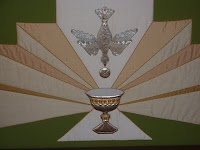I went to seminary at St. Meinrad School of Theology in southern Indiana. The seminary was established by Benedictine monks in the latter part of the 19th century. When we came the school had recently changed its formation to coincide with the official Church, and the U.S. bishops on priestly formation. Studies in church history, scripture, theology, ecclessiology, sacraments, and pastoral skills, were emphasized. Then there were the famous 'non-negotiables.' A certain lifestyle that was expected of a seminarian, that would also be expected of a priest, that one needed to adhere to.
Since the seminary was run by Benedictines, the liturgies were always very prayerful; and spiritual life was foundational. It was made clear that we were not becoming monks, but rather being trained for life in the parish.
As I have said often, the most moving part of the ordination ritual is receiving the bread and wine from the Bishop. In this very short prayer everything that a priest is about is summed up. Take these elements from the people of God, and offer them to God. The priest is also told here to believe and form one's life on the sacrifice that they are celebrating. As a priest it all comes back to the Eucharist and the celebration of the Paschal Mystery. In the parish this is where we meet all of the folks at once, and can have the greatest impact on their lives. The daily mass community becomes this faithful group of pray-ers, who are your best supporters and most important evaluators.
It has been a good 24 years. I am impressed when people remember a homily from eons ago, or time I spent with them or their family in a hospital. While next year is the biggie, I like to take time out to pray, spend time with family and friends, and reflect on the gift of priestly ministry. That God chooses people like me is a real testimony to God's faithfulness, and the power of the Holy Spirit in our Church. May the good things that God has begun be brought to fulfillment.







